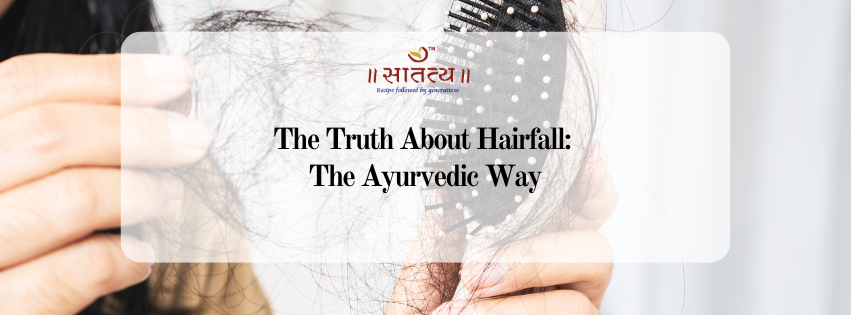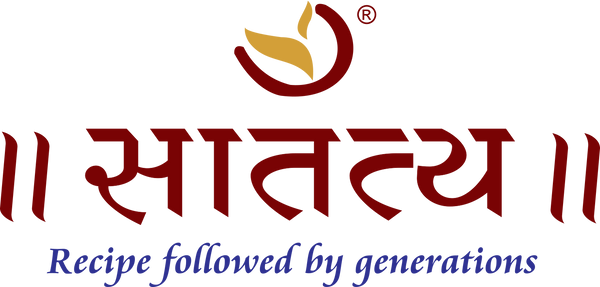
The Truth About Hairfall: The Ayurvedic Way
Hair has always been more than just strands of protein; it is a symbol of vitality, confidence, and inner health. When hair begins to fall excessively, it impacts not only our appearance but also our sense of well-being.
Today, millions face hairfall due to stress, pollution, poor diet, and lifestyle choices. While modern medicine often focuses on quick fixes like topical treatments or supplements, Ayurveda takes a holistic approach, addressing the root cause of imbalance in the body.
Understanding Hairfall: Normal vs. Excessive
· Normal hair loss: Losing 50–100 strands daily is part of the natural cycle (growth, rest, shedding).
· Excessive hair loss: More than this, or visible thinning and patches, signals an imbalance.
Modern Explanation:
· Hormonal fluctuations (thyroid, PCOS, menopause, postpartum)
· Nutrient deficiencies (iron, vitamin D, biotin, zinc)
· Stress and sleep deprivation
· Harsh hair products and heat styling
· Pollution and chemical exposure
Ayurvedic Explanation:
In Ayurveda, hair (Kesha) is considered a byproduct of bone tissue (Asthi Dhatu). Its strength and health depend on how well your body digests, absorbs, and transforms nutrients.
Hairfall is usually caused by:
· Imbalance in Doshas:
o Pitta – Excess heat burns hair roots, causing greying and thinning.
o Vata – Dryness makes hair brittle and weak.
o Kapha – Excess oiliness clogs follicles, leading to hair shedding.
· Weak Agni (Digestive Fire): Poor digestion leads to toxin (Ama) accumulation, blocking nourishment.
· Low Ojas (Vital Energy): Stress, poor sleep, and anxiety weaken immunity and hair strength.
Common Signs of Ayurvedic Imbalance in Hairfall
· Excess scalp heat, itching, or dandruff (Pitta imbalance)
· Dry, frizzy, split ends (Vata imbalance)
· Greasy scalp, heavy hair fall, and dandruff clumps (Kapha imbalance)
· Premature greying (often linked to aggravated Pitta and stress)
The Ayurvedic Way to Repair and Restore Hair Health
Ayurveda doesn’t just look at symptoms, it heals the root cause by balancing diet, lifestyle, herbs, and rituals.
1. Diet for Healthy Hair (Ahara)
What you eat directly reflects on your hair. Nourishment begins inside.
· Foods to Include:
o Cooling foods to balance Pitta: cucumbers, melons, leafy greens, coconut water.
o Healthy fats for lubrication: ghee, flaxseeds, walnuts, sesame seeds.
o Protein-rich lentils and pulses for strong hair roots.
o Iron-rich greens and jaggery to prevent thinning.
o Superfoods: Amla (Vitamin C boost), Bhringraj, Ashwagandha, Fenugreek.
· Foods to Avoid:
o Excessively spicy, oily, fried, or junk food.
o Overconsumption of caffeine or alcohol.
o Packaged foods that weaken digestion and create toxins (Ama).
2. Scalp & Hair Rituals (Dinacharya)
· Oil Massage (Shiro Abhyanga):
Massage scalp 2–3 times a week with Ayurvedic oils like Bhringraj oil, Neelibhringadi oil, or coconut oil. This improves circulation, nourishes follicles, and calms the mind.
· Herbal Hair Packs:
o Fenugreek paste for strength
o Hibiscus leaves & flowers for shine
o Aloe vera gel for hydration
o Amla powder mixed with yogurt for growth
· Cleansing the Ayurvedic Way:
Use mild cleansers like Shikakai, Reetha, or herbal shampoos instead of harsh chemical-based ones.
3. Lifestyle Adjustments (Vihara)
Ayurveda emphasizes that lifestyle and mental well-being are as important as diet.
· Stress Management: Practice yoga, meditation, and pranayama (deep breathing) to reduce cortisol levels.
· Adequate Sleep: Sleep is when your body repairs tissues and restores ojas.
· Protect from Heat & Chemicals: Avoid constant blow-drying, straightening, and harsh dyes.
· Seasonal Care: Adjust diet and hair care as per season, cooling herbs in summer, nourishing oils in winter.
4. Ayurvedic Therapies
For chronic hairfall, Ayurveda recommends therapies such as:
· Shirodhara: Warm oil poured on the forehead to calm the mind, reduce stress, and balance doshas.
· Nasya: Herbal oils administered through the nose to strengthen hair roots and nourish the scalp.
· Panchakarma: Detoxification to eliminate ama and restore digestive strength.
The Ayurvedic Herbs for Hairfall
· Bhringraj (The “King of Hair”): Promotes hair growth and prevents premature greying.
· Amla: Rich in Vitamin C, strengthens roots, boosts shine.
· Brahmi: Calms the mind, reduces stress-related hairfall.
· Neem: Detoxifies the scalp, fights dandruff.
· Ashwagandha: Reduces cortisol, balances hormones.
The Ayurvedic Truth About Hairfall
Unlike quick cosmetic fixes, Ayurveda teaches us that hair health is a reflection of our inner balance. Strong digestion, reduced stress, a balanced diet, and consistent rituals are the true secrets to healthy hair.
When body, mind, and spirit are in harmony, hair flourishes naturally.
